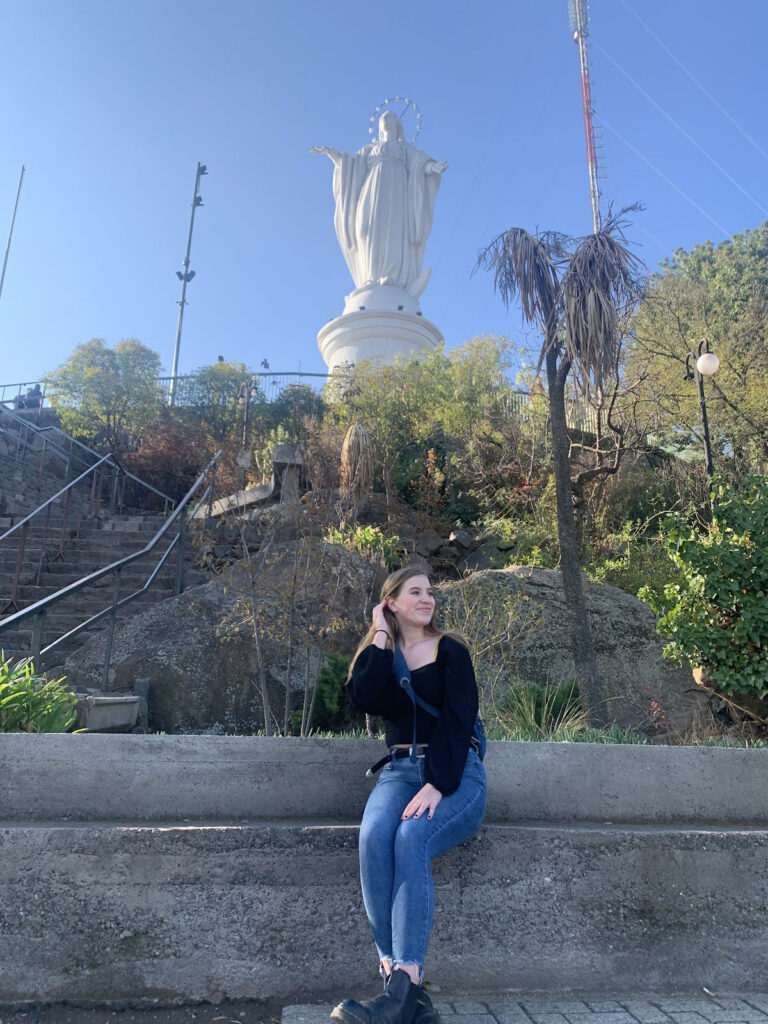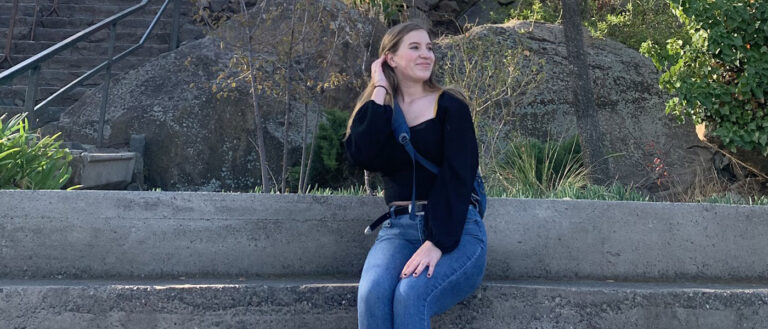As summer gears up, Case Western Reserve University students are pursuing a variety of different experiences before a new academic year begins. And for some, those opportunities are found abroad. Whether studying death, dying and euthanasia in the Netherlands; exploring archaeological sites in Rome; or conducting biology field research in Costa Rica, CWRU offers many opportunities for students to get up close and personal with their passions—and find new ones along the way. Curious what their experiences have been like? The Daily is putting the spotlight on students who are studying—or recently traveled—abroad.

This week, we’re featuring rising fourth-year student Delphine Clatanoff. A native of Chicago, Clatanoff is pursuing dual majors in biology and international studies at Case Western Reserve—the latter of which requires her to complete a practicum abroad. Earlier this month, she did just that, wrapping up a study abroad program in Santiago, Chile, through IES Abroad Santiago, where she studied at Pontificia Universidad Católica de Chile.
As part of this practicum experience, she immersed herself in her topic of focus—global health—through IES Abroad Santiago’s health studies program. The program allows students to conduct clinical observations in Chile, and to complete a healthcare seminar course that discusses Chile’s healthcare system in depth.
“IES Abroad Santiago could not have been a better fit,” Clatanoff explained. “Learning Spanish and traveling within Latin America has always been a passion of mine, so I was super excited to be able to [visit] Chile to learn more about its distinct culture and style of Spanish, while also being able to live in a more urban city.”
1. You shared a photo with us about your travels. Can you give some background on it?
This is a photo at the top of Santiago’s Cerro (Hill) San Cristóbal, where the virgin statue watches over the city. Visiting the top of the hill is an excellent way to get a panoramic view of the entire city, much like I tried to do during my time in Santiago. The sanctuary at the top of the hill is actually dedicated as a quiet space of reflection and prayer, and I have visited many times to sit and enjoy the view while I meditated.
2. What was your favorite part of studying abroad?
My favorite part of studying abroad has been the independence I’ve had. I’ve traveled all over Chile during my weekends and days off, and planned all of those trips myself or with friends. I remember my study abroad advisor, Cami, saying that studying abroad is like a fast track to adulthood, and I couldn’t agree more. I can book bus tickets, buy sim cards, exchange currency, and find places to stay all in a different language, and that didn’t come easily, but the freedom it has granted me is indescribable.
3. What is something you learned about yourself while studying abroad?
I think I’ve learned to have more confidence in myself, and have become a lot more secure in my own identity. When you study abroad, shame quickly goes out the window—if you need something, you will figure out a way to communicate it, no matter how many grammatical errors or wrong words you use! The struggles I’ve faced here have shown me an inner strength and confidence I never knew I had, and I would like to think I’m much cooler under pressure now. When you’ve been through it all, you learn to not sweat the little things. Also, of course, my Spanish has improved by leaps and bounds.
4. Do you encourage other students to study abroad?
Of course I encourage other students to study abroad! In fact, I want to go a step further and say that if you have the language capacity, you should immerse yourself in your host culture and country as much as possible—that means language immersion as much as possible. I lived and spoke only Spanish with a Chilean host family, and took all of my classes in Spanish.
I even traveled to the south of Chile with my Chilean friend and her family to visit some natural hot springs, and we spoke only Spanish the entire trip! It can be comforting to be able to communicate in English with people when you’re abroad, but even with the challenges I faced with a language barrier, I believe that the unique experiences I had here are 100% due to my choice to dive head first into authentic Chilean culture—which really only exists in the Spanish language.
5. Can you explain some things you learned about Chile?
Chile was actually under a military dictatorship between the years of 1973-1990. I highly encourage people to watch the Chilean film Machuca if they are interested in learning more about the country’s atmosphere in the years leading up to the coup, as well as the deeply ingrained inequalities of Chile’s education system. Furthermore, the current Chilean constitution was written under this dictatorship, so there is currently a national convention dedicated to writing a new constitution. The first draft was just released a couple of weeks ago, and it will be mandatory that every Chilean citizen vote for or against the final draft in September. Finally, Chile just elected their youngest-ever president, Gabriel Boric, who’s only 36 years old and came into the political sphere through his work as a student activist. He’s also a huge Taylor Swift fan, for all my Swifties out there. Overall, it’s a super exciting time to be here in Santiago.

